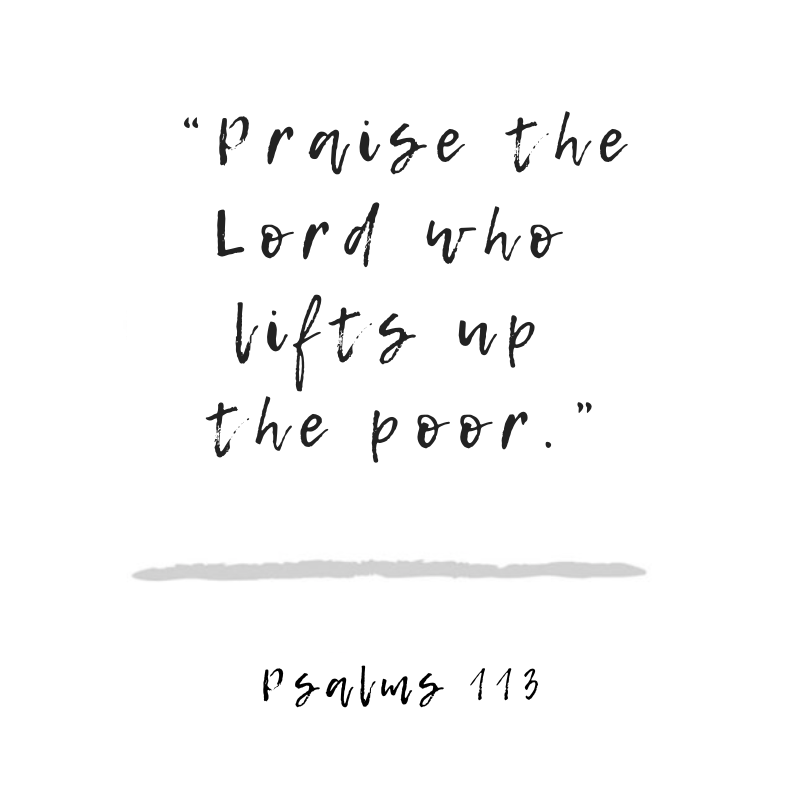Psalm Reflection: The Twenty-fifth Sunday in Ordinary Time - Cycle C

“Praise the Lord who lifts up the poor.” - Psalms 113
“The Lord helps those who help themselves.”
I have heard so many people say it over the years, and every time I hear it I have a gut reaction that there is something wrong with that phrase.
Although it is often mistakenly thought to come from the Bible, it does not appear anywhere in Scripture.
Aesop’s fable Hercules and the Waggoner contains an early version of this idea, where Hercules tells a man stuck in the mud to put his own shoulder to the wheel before calling for divine help. The phrase gained popularity in the English-speaking world through Benjamin Franklin, who included it in his Poor Richard’s Almanack in 1736. Franklin’s version reflects an emphasis on self-reliance and industriousness, very American ideals and principles, but not necessarily Biblical ones.
In fact, the Bible often presents the opposite message: God helps those who cannot help themselves. For example, Psalm 34:18 says, “The Lord is close to the brokenhearted and saves those who are crushed in spirit.” Jesus’ ministry was marked by His care for the helpless—the poor, the sick, and the sinner—showing that God’s grace is not earned by human effort but freely given to those who recognize their need for Him.
That is at the heart of what the Responsorial Psalm proclaims this Sunday: “Praise the Lord who lifts up the poor.” It is God doing the work, and though we are privileged to be coworkers in the vineyard of the Lord, we do not do anything for God that He cannot do Himself. He wants our participation and our effort but that is an expectation in relationships, but it is not necessary in order for Him to be able to come to our aid when we are in need. We simply need to be still or to cry out to God and He will be there.
“The LORD will fight for you; you have only to keep still.” - Exodus 14:14
So the phrase, “The Lord helps those who help themselves,” while catchy, can sometimes mislead people into thinking they must rely solely on their own strength. It can also cause us to fail to have compassion for those who we perceive are not trying hard enough to do better or be better. It can also cause us to fall into heresies like Pelagianism, the heresy that falsely taught that we can earn our salvation, or the Prosperity Gospel, which says if we follow God then only good things will happen to us. Neither of these ideas are Biblical, nor do they align with human experience. True Christian teaching calls us to trust in God’s providence and to seek His help in all things, acknowledging that our strength comes from Him alone.
“My grace is sufficient for you, for my power is made perfect in weakness.” -2 Corinthians 12:9
The Lord does not help those who first help themselves. The Lord helps the helpless.
We are all helpless before the Lord, whether we care to admit it or not. So this Psalm should absolutely remind us of the need to lift up the poor and to be the hands and feet of Jesus in the world, but it should also remind us of how poor and destitute we would be without the Lord, and that He will always be there for us when we ask.
Reflect on a time when you felt helpless or brokenhearted. How did you experience God’s presence or His help during that season?
In what ways do you see yourself as spiritually “poor” or in need of God’s grace? How does this realization shape your relationship with Him?
Consider the difference between self-reliance and reliance on God. Are there areas in your life where you are trying to “help yourself” instead of trusting in God’s providence?
How can you be more compassionate toward those who are struggling, especially when it seems they are not “helping themselves”?
How can this Psalm inspire you to praise God not only for His care for the poor but also for His constant care for you, even in your moments of spiritual poverty?
I am praying for you, please pray for me and my family, and I will see you in the Eucharist.
Matt
This reflection is based on the Responsorial Psalm for this Sunday, September 21st, 2025, the Twenty-fifth Sunday in Ordinary Time - Cycle C: Psalms 113:1-2, 4-6, 7-8
MANNA is a ministry creating blogs and podcasts to encourage and inspire others to grow in relationship with Jesus Christ and live out their Catholic faith.